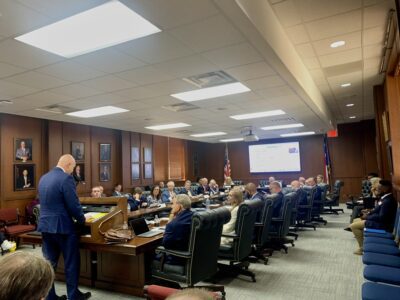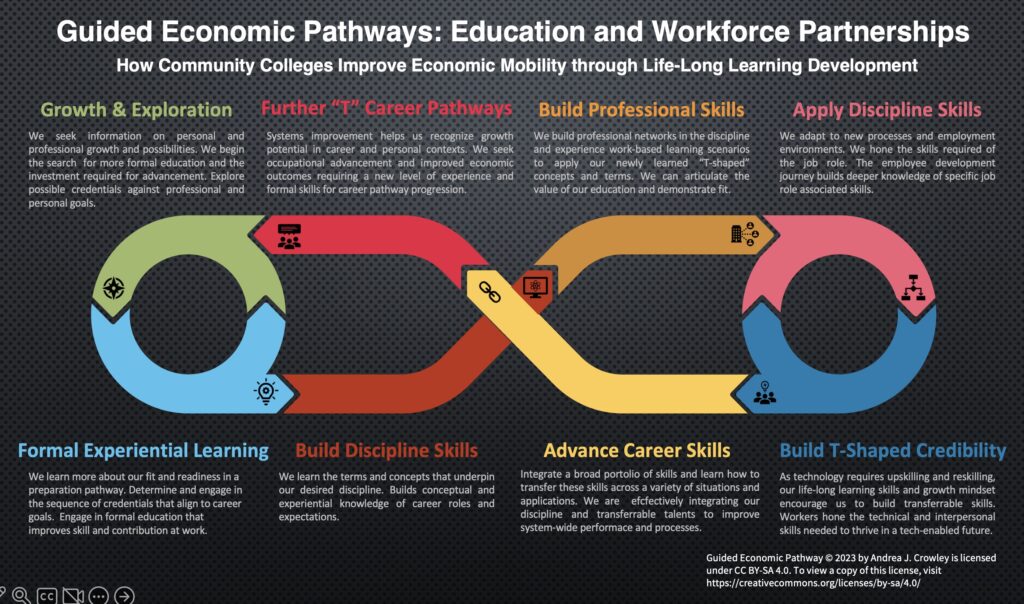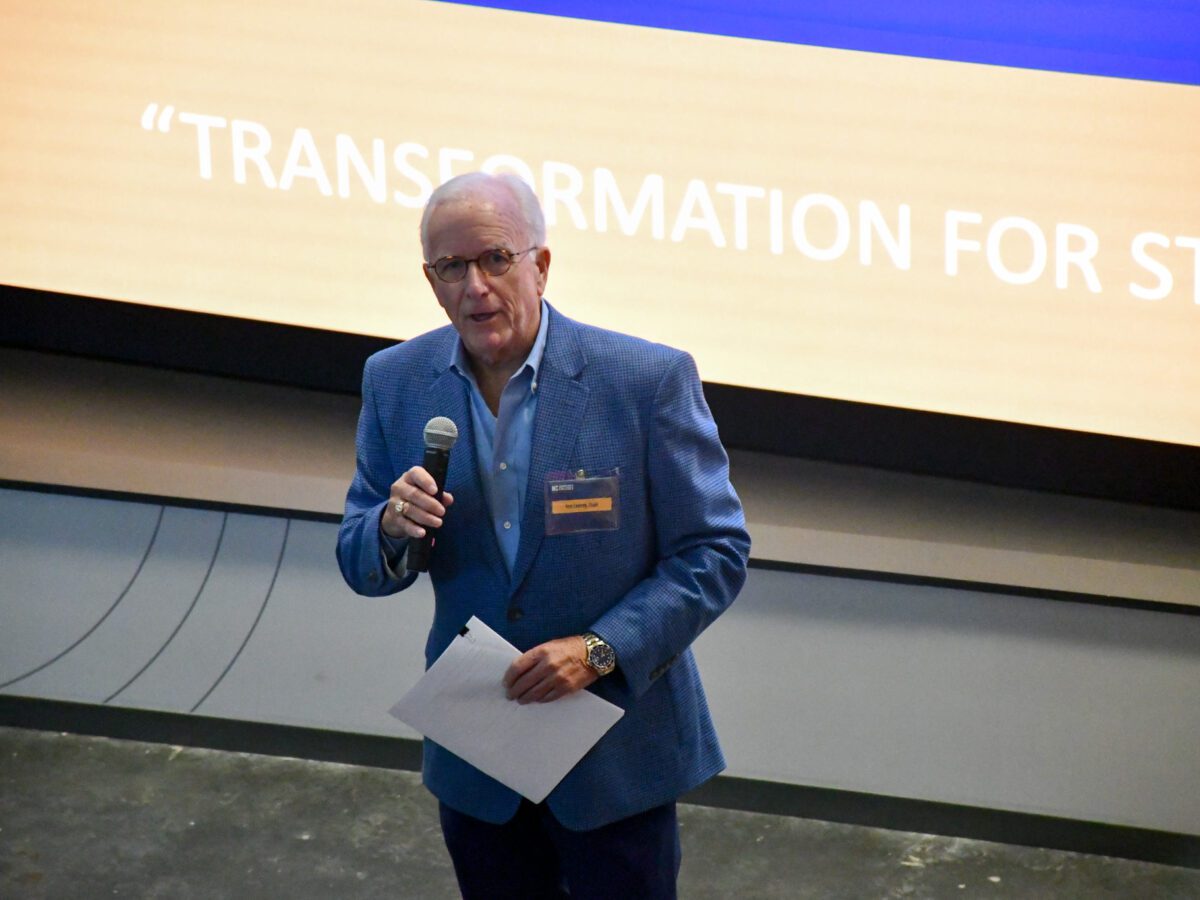
North Carolina’s 58 community colleges have a $19 billion annual impact on the state’s economy, supporting 320,000 jobs in North Carolina, according to a 2021 economic impact study conducted with support from the N.C. General Assembly.
Last week, the N.C. Community College System (NCCCS) held a two-day summit to kick off a new strategic planning process that will shape the future of community colleges in North Carolina. The event convened elected officials, national and state leaders, industry partners, and other stakeholders.

State Board of Community College members were briefed by Dr. Laura Ullrich, a leading economist and director of economic research at Indeed, on the state and national forces that will constrain what is possible in crafting the strategic plan.
“The U.S. labor market isn’t just slowing — it is now dangerously close to stalling,” Ullrich wrote in this press release.
In August 2025, U.S. employers added just 22,000 jobs and the unemployment rate rose to 4.3%, according to the press release. Not counting the pandemic period, that’s the highest the unemployment rate has been since September 2017. North Carolina, however, is faring better economically than the country overall — the state’s unemployment rate in August was 3.7%. Unbalanced job growth continues to define the market, the press release says.
With this backdrop, legislators at the summit called for bold and courageous leadership across the community college system.
From customized industry training to apprenticeships to small business centers, the Board was reminded of the critical role community colleges play in economic growth both locally and collectively statewide.
“Imagine yourself as deputized economic developers,” Donny Hicks, executive director of the Gaston County Economic Development Corporation, told the Board.
Read more from the summit

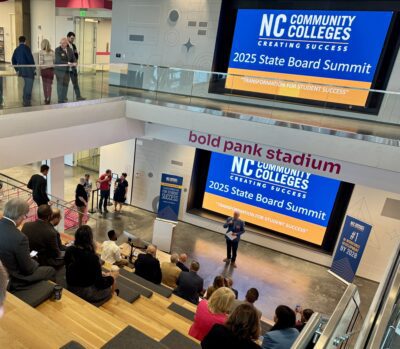
State Superintendent Maurice “Mo” Green also shared his recently released strategic plan with the Board, prompting conversations about how to align the K-12 and community college strategic plans moving forward.
“If we are not partners, this does not work,” Green said.
NCCCS President Dr. Jeff Cox said he and Green have already been working together on changes to NC College Connect, a new direct admissions program in the state. At the start of this school year, for the first time, about 62,000 students received a letter telling them where they had already been automatically accepted to college.
Leaders at the summit called NC College Connect a game changer for the state. Parents are excited the state is leading the way on easing access to college, and students are happy they don’t have to draft college application essays.
Next fall, Cox said he and Green are expanding the idea so that every rising senior will receive a letter, since all of them are eligible to attend community college.
Through opportunities created by dual enrollment, career and technical education, or NC College Connect, Green said “students can see tomorrow today.”
A portion of the summit focused on further transforming the student experience, preparing individuals for the technological advances shaping today’s workforce and improving their economic mobility.
“Getting a job is not economic mobility, real progression is economic mobility,” said Dr. Andrea Crowley, executive director of the system’s North Carolina Student Success Center.
For economic mobility to improve, Crowley said that systems must adapt the student experience in ways that prioritize lifelong learning as a key output.
Gov. Josh Stein, who was in Washington, D.C. urging Congress to provide additional funding for Hurricane Helene recovery, also sent remarks to the summit.
“Community colleges are engines of opportunity for the state,” Stein said.
The governor recently established the Council on Workforce and Apprenticeships, which is tasked with developing “strategies to ensure that economic growth continues, employers have the talent they need, and jobseekers have pathways to careers that support thriving families and communities.”
At the federal level, there is support for apprenticeships and workforce Pell grants.
There is also philanthropic support for the NCCCS, which recently announced the largest private grant ever — $35.6 million from Arnold Ventures — for Boost, North Carolina’s accelerated college-to-career program.
At the summit, Cox announced an additional $3 million from the Kenan Charitable Trust to support Boost.
“Momentum is building for the North Carolina Community College System,” Cox said.
EdNC will be covering the strategic planning process and the leadership transition in the year ahead. Stay tuned. Below, you can find a brief review of other items discussed by the Board last week.

Specifics on new strategic plan
Following the two-day summit, the Board also met for its regular monthly meeting on Thursday afternoon and Friday morning.
During its regular meeting, the Board continued discussions for its next strategic plan, which is set to be approved by September 2026 and will go through 2029.
The new plan will be developed over three stages: strategic goal development from now through January 2026, KPI (key performance indicators) and strategic implementation tactic development through June 2026, and then strategic plan approval and rollout through September 2026. You can read a timeline of the planning process on the system’s website.
NCCCS staff presented a framework for the new strategic plan to the Board.
“The 2026-29 Strategic Plan will establish the system’s direction at the highest level,” the framework document says.
According to that document, the current strategic plan included six layers: goals, KPIs, objectives, strategies, annual priorities, and tactics. The new model will “streamline the structure into two companion documents.”
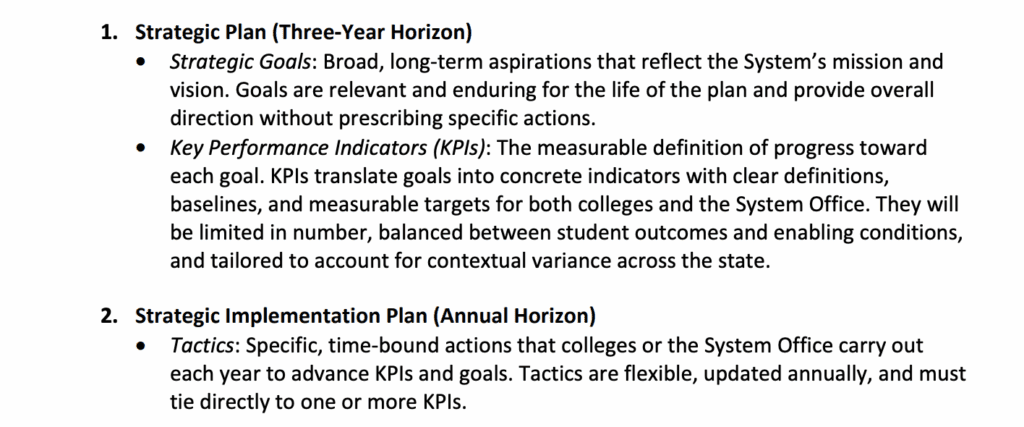
To provide clarity in tracking progress toward plan goals, the document says the plan will distinguish between outcomes/results and milestones/activities.
Three roles are identified in the planning document: co-owners, which includes the system office and 58 community colleges; partners, which includes public and private entities that invest resources for the system; and stakeholders, which includes students, families, communities, and employers who directly benefit from the work of the system.
Moving forward, the Board’s strategic planning committee will oversee development of the plan and provide regular updates to the full Board. Other Board committees will monitor specific tactics in the plan aligned with their charter, the document says.
“The new planning model aims to unify leadership, strengthen collaboration with colleges, and create a culture both disciplined and adaptive—equipping the next System President and NCCCS to deliver results for students, communities, and employers,” the document says.
Last week, the Board also heard a presentation on the 2024-25 Strategic Plan Annual Report. The current strategic plan, for 2022-26, was approved in October 2022.
“Since adoption of the plan in late 2022, the North Carolina Community College System has made measurable progress across all five goals,” the report document says.
The plan includes five primary goals:
- Recruiting and retaining faculty and staff. According to the report, faculty and staff “have seen meaningful salary increases – of 13% and 15%, respectively, since 2020-2021 – thanks to multiple rounds of legislative investment.”
- Strengthening enrollment. The report says enrollment has “rebounded significantly,” helping mitigate pandemic declines. Headcount enrollment increased nearly 11% since fall 2021, the report says, while full-time equivalent (FTE) enrollment rose by nearly 14%.
- Supporting student success. The document identifies the following “persistent challenges” for students: pandemic learning loss, mental health needs, and competing work and family obligations. The report highlights several completion and persistence rates that have improved, including a 14% increase in credential completion in the last three years.
- Advancing economic and workforce development. The report says the system “continues to solidify its role as North Carolina’s workforce engine.” Career and Technical Education (CTE) completion increased by 18% since 2021-22, and CTE exiter median quarterly earnings saw modest gains.
- Improving system funding and effectiveness. The NCCCS has “taken significant steps to expand funding capacity alongside the North Caroline Community Colleges Foundation,” the report says. Specifically, the report highlighted the Arnold Ventures grant for Boost, and the system’s proposal for a new funding model, Propel NC, which is designed to align programs with workforce needs.
The report says progress has also been made on its 2024-25 priorities for plan implementation, including modernizing technology systems, operationalizing a labor market-driven model, operating with excellence and efficiency, executing a comprehensive marketing and enrollment strategy, and expanding resources and supports.
You can read the full report on the NCCCS website.
Related reads

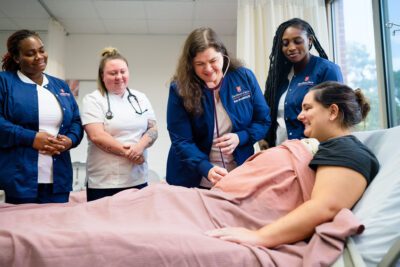
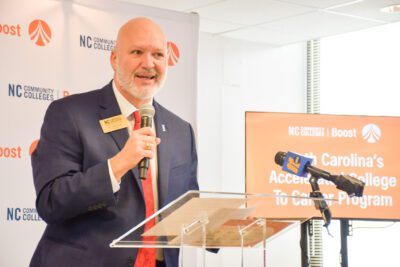
Other meeting business
- The Board approved ApprenticeshipNC’s annual report for Fiscal Year (FY) 2024-25. During that year, ApprenticeshipNC served 16,446 apprentices and pre-apprentices, the report said, and registered a combination of 326 new apprenticeship programs and new participating employers. The report also highlights “the need to secure sustainable funding to maintain momentum as federal grants sunset in 2026.”
- Another annual report, on the NC Career Coach Program, was also approved by the Board. Through that program, community college-employed career coaches help high school students identify career goals to connect them with educational pathways. During FY 2024-25, 92 career coaches were deployed across 45 community colleges, the report said, with 31,583 students served across 64 school districts. There was a 57% increase in students served from the previous school year.
- As part of its consent agenda, the Board also approved several allocations:
- $31.7 million for FY 2025-26 and $31.7 million for FY 2026-27 for faculty recruitment and retention in high-demand fields, appropriated in the 2023 state budget.
- A little over $6 million for each fiscal year in 2025-27 for nursing faculty salary increases. The 2023 state budget originally appropriated $7.1 million to increase nursing faculty starting pay by 10% — with other nursing faculty able to receive salary increases up to 15%. This session, lawmakers reduced the appropriation by $1.1 million due to unused funds.
- A reallocation of $1.3 million to eight community colleges that experienced enrollment declines due to Hurricane Helene: Asheville-Buncombe, Blue Ridge, Caldwell, Haywood, Mayland, Southwestern, Tri-County, and Wilkes community colleges. The reallocated funds come from previously unspent hurricane relief funds.
- Funds to reimburse 13 colleges participating in the More Than A Job NC (MTAJ-NC) training initiative. The Board approved $695,000 in 100% funds and $1.3 million in 50% federal matching funds. MTAJ-NC is a part of the national SNAP Employment & Training Program administered by the U.S. Department of Agriculture (USDA).
- Nearly $1.3 million in the Strengthening Career and Technical Education for the 21st Century Act (Perkins V) carry over funds from the 2024-25 academic year to the 2025-26 academic year, “to be allocated to 57 community colleges to enhance” their CTE programs.
- Finally, the Board approved a document on state aid allocations and budget policies, which includes information on state and federal funds for the current fiscal year, minimum and maximum salary rates for employees, college presidents’ salaries, and more.
The full Board meets next on Oct. 16-17.
Editor’s Note: Arnold Ventures supports the work of EdNC.
Recommended reading
